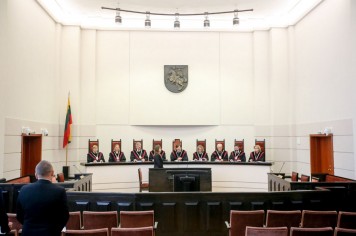On January 11, 2019 the Constitutional Court of the Republic of Lithuania held a public hearing on the case determining whether Constitutional provisions regarding freedom of movement of family members apply for same-sex couples. In its judgement the Constitutional Court stressed that refusal to issue a temporary residence permit to stay in Lithuania to a spouse or partner cannot be based solely on the foreigner’s gender identity and/or sexual orientation.
The Constitutional Court judged that, contrary to the claim of the applicant (Migration Department under the Ministry of the Interior of the Republic of Lithuania), temporary residence permit to stay in the Republic of Lithuania for a foreigner who is not a citizen of the European Union or the European Free Trade Association countries may be issued not only in the case when partners are of different sex, but also to same-sex partners, who registered marriage or partnership in the country where same-sex relationships are legal.
The Constitutional Court emphasized that one of the forms of discrimination prohibited by Article 29 of the Constitution is the restriction of human rights due to person’s gender identity and/or sexual orientation, which should be regarded as humiliation of human dignity.
The Constitutional Court also drew attention to the fact that only by respecting the dignity of every human being, the state can be considered a truly democratic state, and the Constitution defends an individual. In a democratic state under the rule of law, the prevailing views or stereotypes of the majority of members of society cannot be considered as constitutionally important objective to discriminate against individuals solely on the basis of their sexual identity and/or sexual orientation and limit the right to protection of personal and family life, guaranteed by the Article 22 of the Constitution.
The Constitutional Court reminded that, as noted in the Constitutional Court ruling of September 28, 2011, the Constitutional concept of family may not be derived solely from the institute of marriage enshrined in the Article 38 of the Constitution; marriage is one of the foundations of the family, but that does not mean that no other form of family than marriage is protected under the Constitution. The Constitutional Court also noted that, unlike the constitutional concept of marriage, the constitutional concept of the family is, among other things, gender-neutral.
Summarizing the constitutional regulation on the relevant aspect of the case, the Constitutional Court noted that under the Constitution, the legal regulation of the free movement of persons in the European Union and in the context of migration must be based on the principles of respect for human dignity, private and family life, and equality of persons.
More information about the Constitutional Court decision on the British media: Pinknews.co.uk, Gaystarnews.com.




